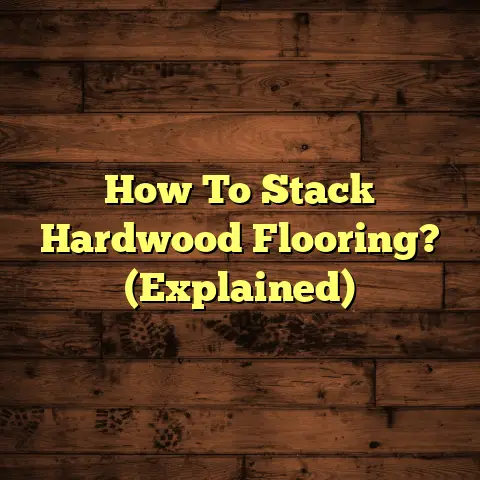Epoxy Resin Flooring Cost Per M2 (Explained)
Epoxy Resin Flooring Cost Per M² (Explained)
When it comes to flooring options, epoxy resin flooring has gained significant popularity due to its durability, aesthetic flexibility, and ease of maintenance. However, understanding the costs associated with installing epoxy resin flooring can be complex. This article will provide a detailed overview of the major cost factors, breakdowns, comparisons with alternative flooring options, and other essential considerations to help you make an informed decision.
Overview of Major Cost Factors
Several key factors determine the overall cost of epoxy resin flooring installation. Here’s a closer look at each one:
1. Area Size
The total square meter (m²) area that needs to be covered is a primary factor influencing the cost. Generally, the larger the area, the more economical the price per m² tends to be.
2. Type of Epoxy
Different types of epoxy resin are available, including:
- Standard Epoxy: Typically less expensive but may not offer the same durability as more advanced options.
- High-Performance Epoxy: More costly but provides superior durability and resistance to chemicals.
- Decorative Epoxy: Includes flake or metallic options that enhance aesthetics but can increase costs significantly.
3. Labor Costs
Labor costs can vary widely based on location, the complexity of the job, and the contractor’s expertise. Expect to pay anywhere from $30 to $100 per hour for professional installation.
4. Floor Preparation
If the existing floor needs removal or significant preparation, this can add to the overall cost. Proper surface preparation is crucial for ensuring the longevity and performance of the epoxy.
5. Subfloor Replacement
In cases where the subfloor is damaged or unsuitable for epoxy application, replacement may be necessary. The cost of subfloor materials and installation must be included in the overall budget.
6. Material Grade
The quality of epoxy materials also plays a vital role in determining costs. Higher-grade materials generally come with a higher price tag but offer better performance and longevity.
7. Room Size/Layout
Complex room layouts or areas with many obstacles may require more labor and materials, driving up costs.
8. Installation Type
Installation methods can vary, with basic pouring being less expensive than decorative options that require more intricate application techniques.
Detailed Cost Breakdown
Here’s a rough estimate of the costs associated with epoxy resin flooring, broken down by various project sizes and types:
| Project Size | Cost Range (per m²) | Total Estimated Cost |
|---|---|---|
| Small Room (10 m²) | $50 – $150 | $500 – $1,500 |
| Medium Room (25 m²) | $40 – $120 | $1,000 – $3,000 |
| Large Room (50 m²) | $35 – $100 | $1,750 – $5,000 |
| Commercial Space (100 m²) | $30 – $90 | $3,000 – $9,000 |
Additional Costs
- Floor Removal: $3 – $5 per m²
- Subfloor Preparation: $5 – $15 per m²
- Decorative Additives: An extra $10 – $30 per m²
Comparing Costs: Epoxy vs Alternative Flooring Options
When considering flooring choices, it’s essential to understand how epoxy resin compares to alternatives like laminate, vinyl, and carpet.
1. Laminate Flooring
- Cost: $15 – $30 per m²
- Pros: Affordable, easy to install
- Cons: Less durable than epoxy, cannot be refinished
2. Vinyl Flooring
- Cost: $20 – $40 per m²
- Pros: Water-resistant, comfortable underfoot
- Cons: May not offer the same aesthetic appeal as epoxy
3. Carpet
- Cost: $10 – $25 per m²
- Pros: Soft underfoot, good insulation
- Cons: High maintenance and not as durable as epoxy
Signs That Hardwood Floors Need Replacement
While this article primarily focuses on epoxy resin flooring, it’s worth discussing when hardwood floors might need replacing:
- Significant Water Damage: Prolonged exposure to moisture can lead to warping.
- Deep Scratches or Gouges: If refinishing is no longer an option due to wear.
- Severe Cupping or Crowning: Indicates structural issues.
- Persistent Odours: May suggest mould or mildew issues.
Pros and Cons of Epoxy Resin Flooring
Pros:
- Durability: Highly resistant to wear and tear.
- Aesthetics: Offers a wide range of design options.
- Low Maintenance: Easy to clean and maintain.
- Chemical Resistance: Ideal for industrial settings.
Cons:
- Initial Cost: Higher upfront investment compared to some alternatives.
- Installation Complexity: Requires skilled professionals for best results.
- Curing Time: Needs time to cure properly before use.
Professional Installation vs DIY
Choosing between professional installation and DIY can significantly impact your budget:
Professional Installation
- Cost: Typically adds $30 – $100 per hour.
- Benefits: Ensures proper application and longevity; reduces risk of mistakes.
DIY Installation
- Cost Saving: You can save on labor costs.
- Tools Required: Expect to invest in tools like mixers, trowels, and safety gear.
- Skills Needed: Requires knowledge of mixing and applying epoxy; improper installation can lead to costly failures.
Questions to Ask Hardwood Flooring Contractors
When hiring a contractor for your flooring project, consider asking:
- What is included in your estimate?
- Can you provide references from past clients?
- How long will the project take?
- What warranties do you offer?
- Are you licensed and insured?
Hardwood Floor Care and Maintenance Tips
To maximize the longevity of your hardwood flooring, consider these maintenance tips:
- Regular Cleaning: Sweep or vacuum regularly to remove dirt and debris.
- Humidity Control: Maintain indoor humidity levels between 30% and 50% to prevent warping.
- Use Area Rugs: Place rugs in high-traffic areas to reduce wear.
- Avoid Excessive Water: Clean spills immediately and avoid wet mopping.
- Periodic Refinishing: Refinish every few years to restore shine and protect the wood.
Conclusion
Epoxy resin flooring presents an attractive option for both residential and commercial spaces due to its durability and aesthetic appeal. By understanding the various cost factors and making informed decisions about installation methods, materials, and maintenance practices, you can ensure that your flooring investment pays off in the long run. Whether opting for professional installation or considering a DIY approach, being well-informed will help you achieve desirable results while staying within budget.





